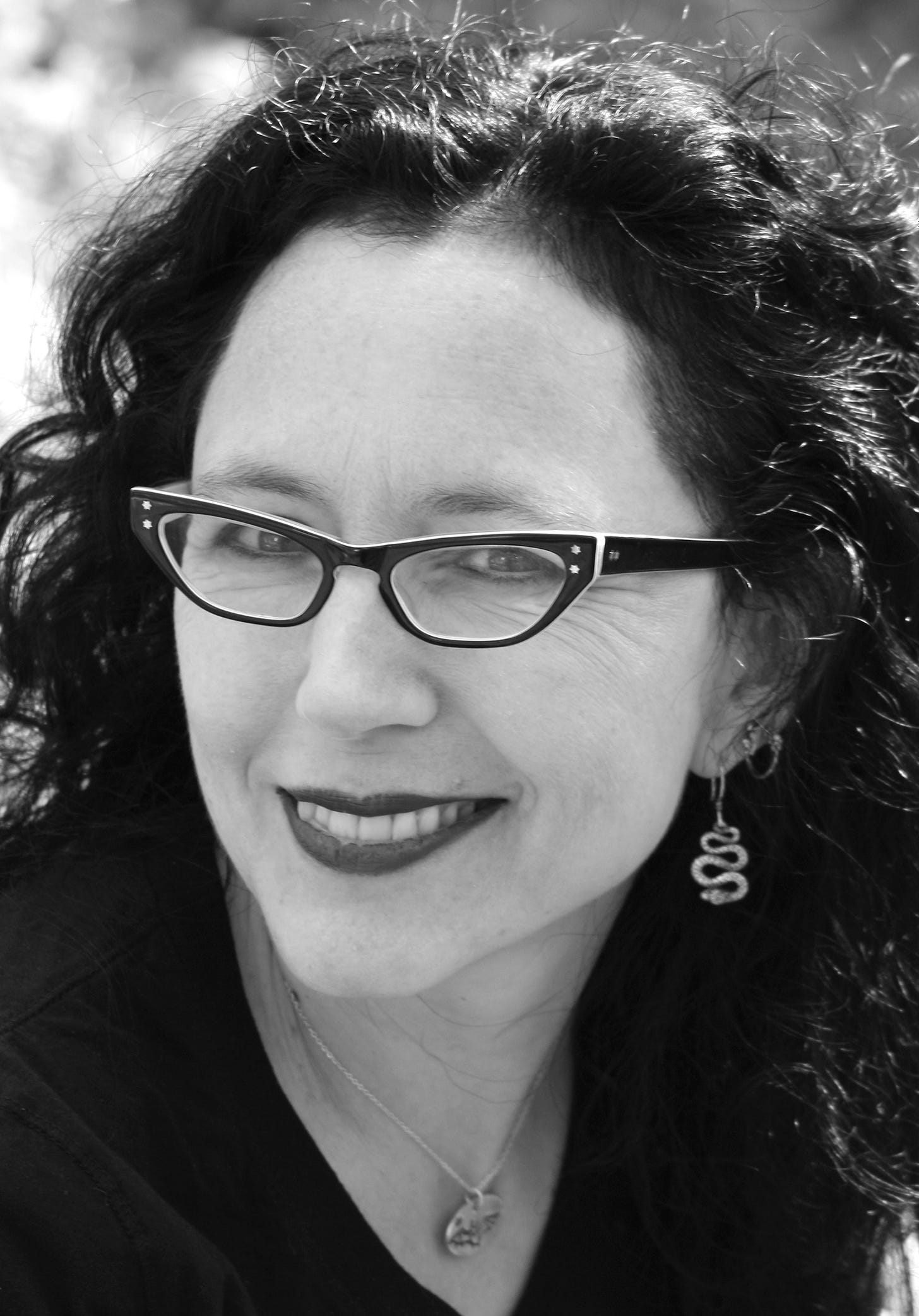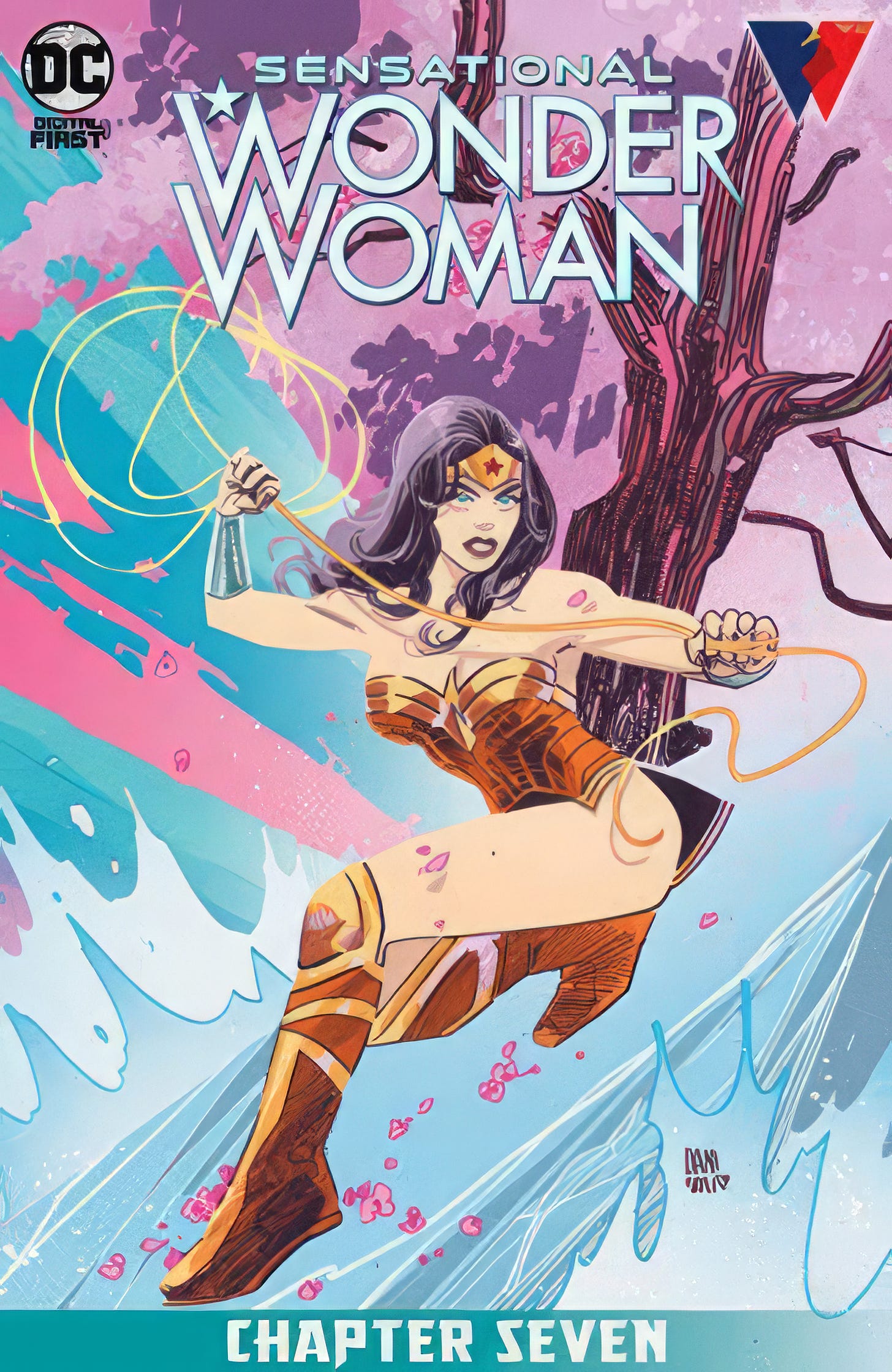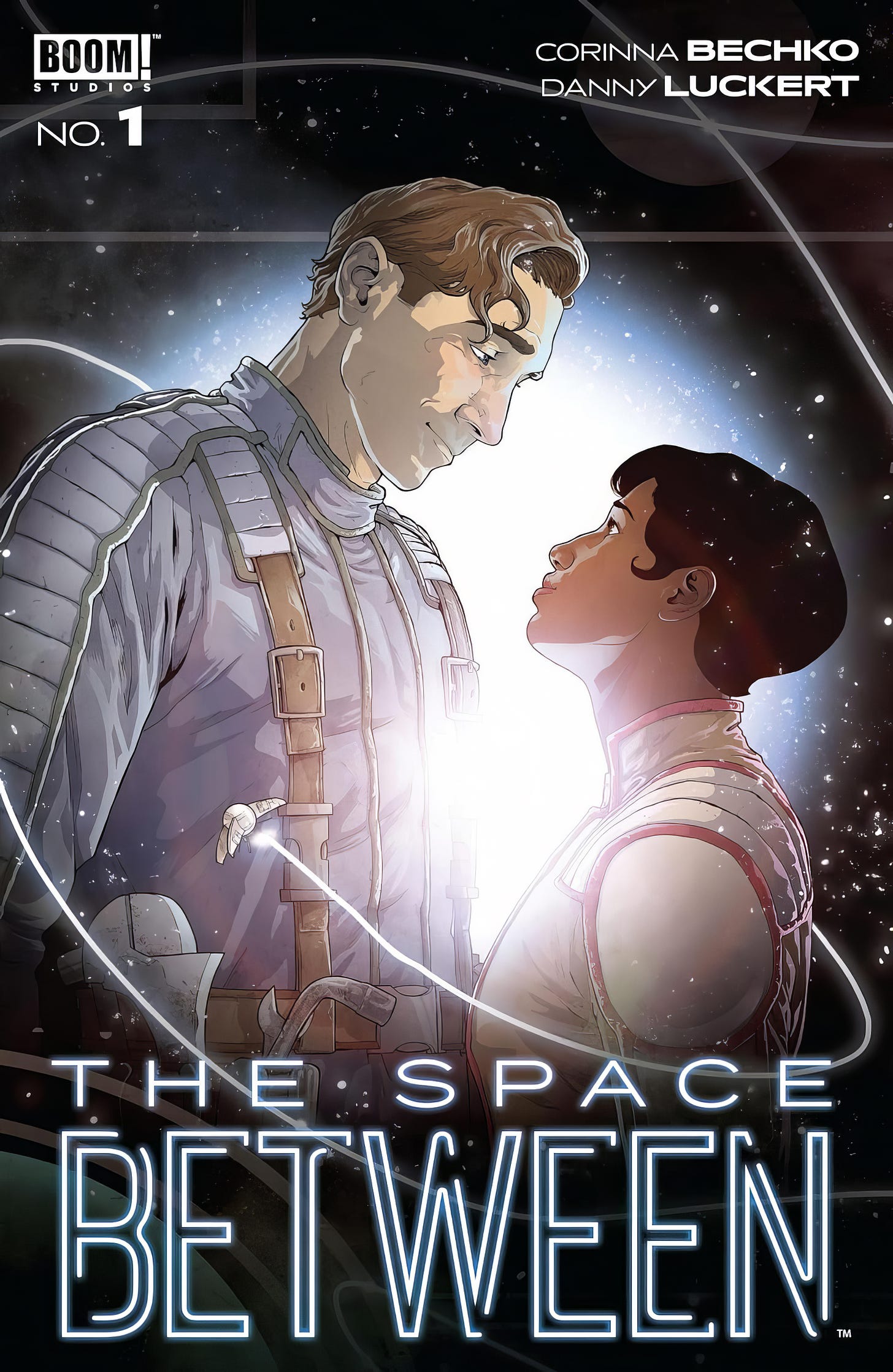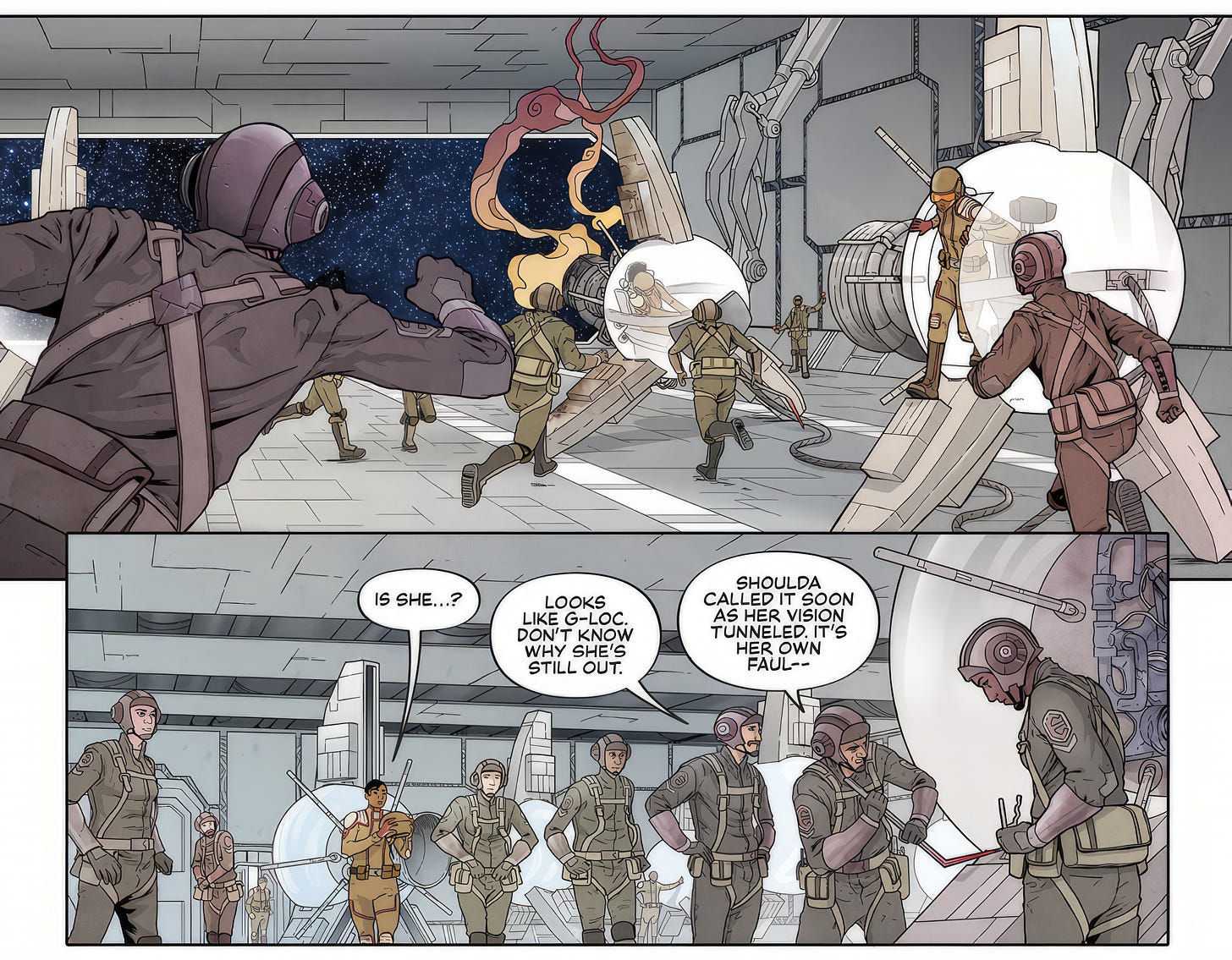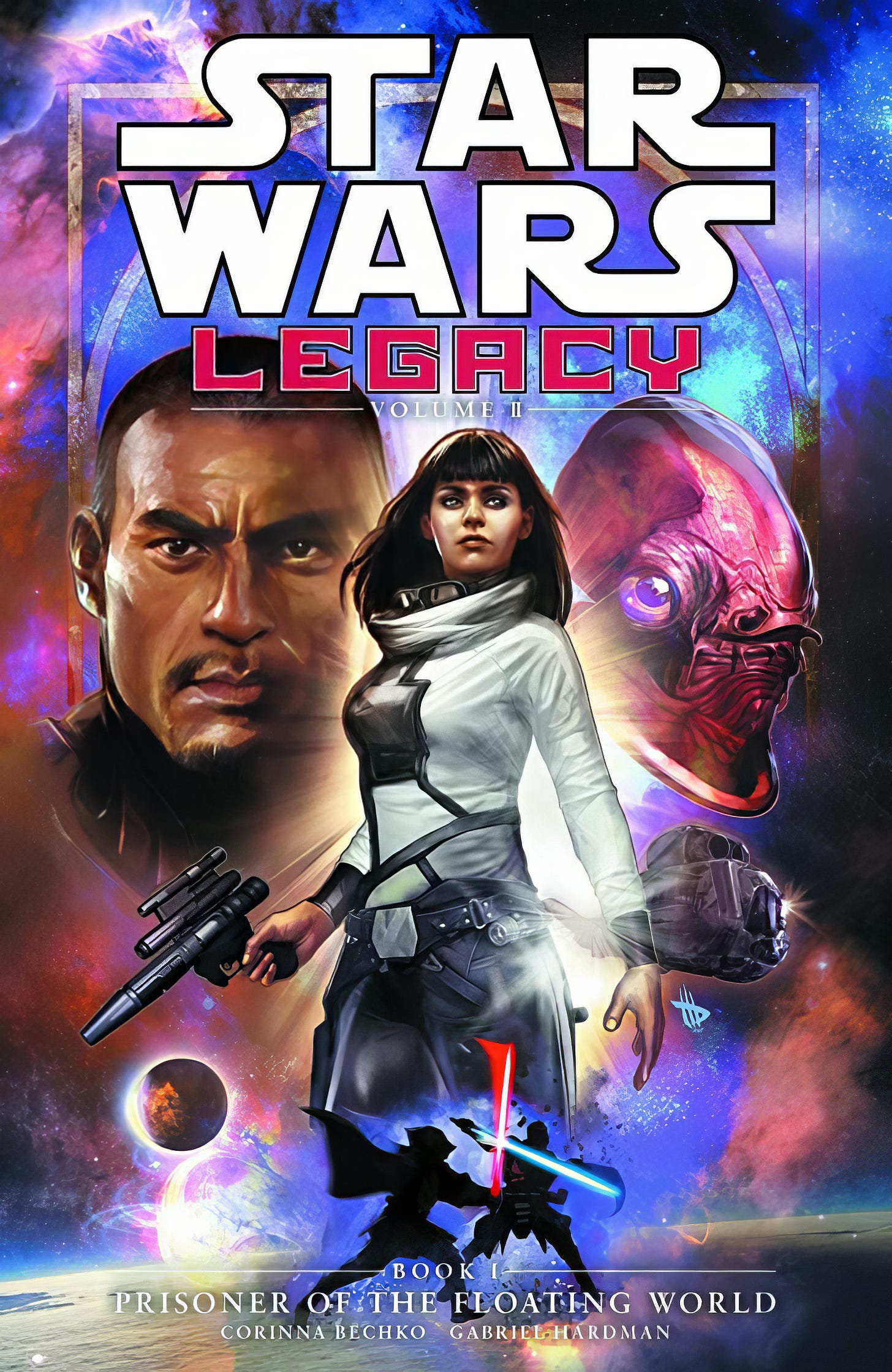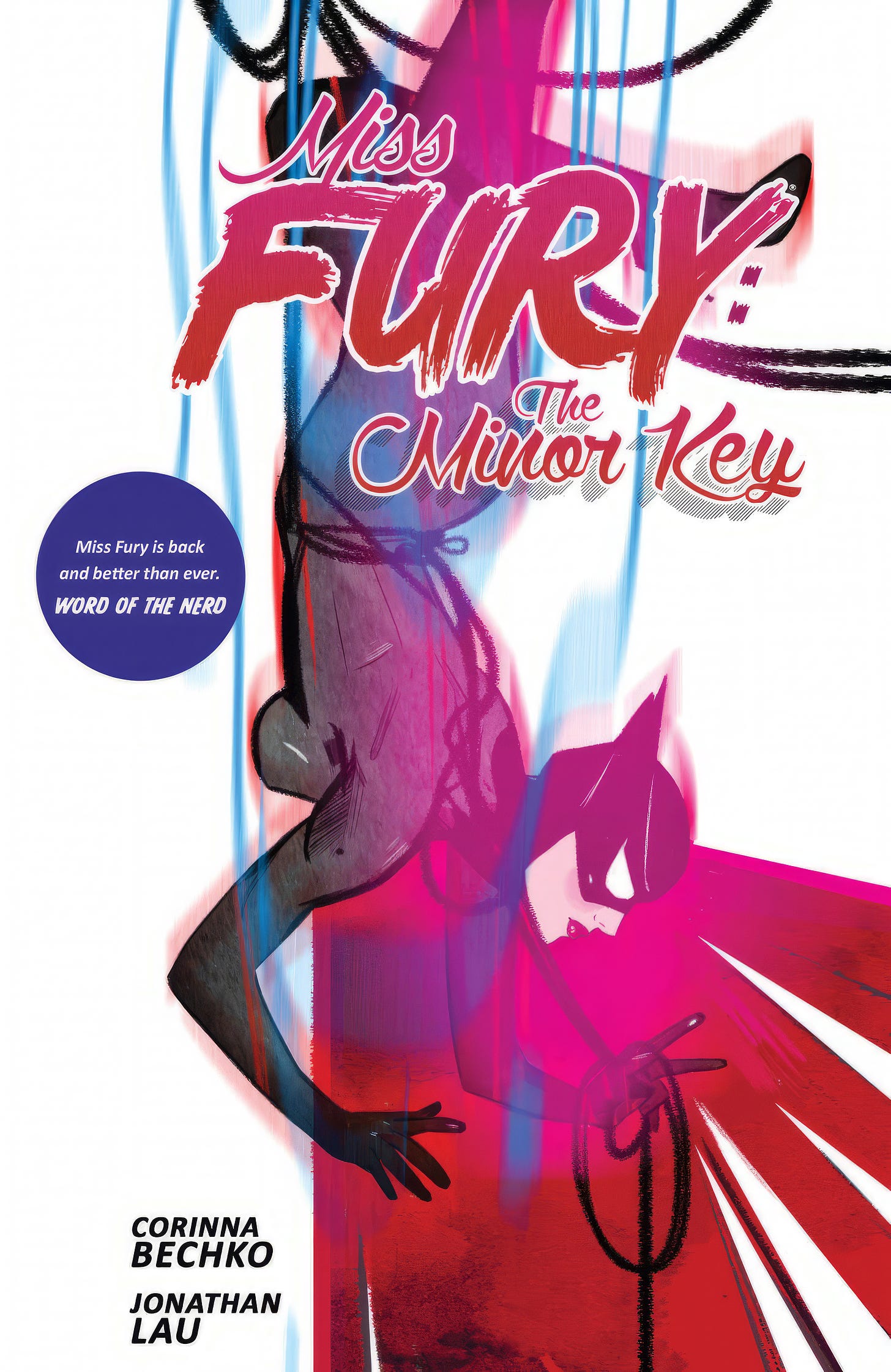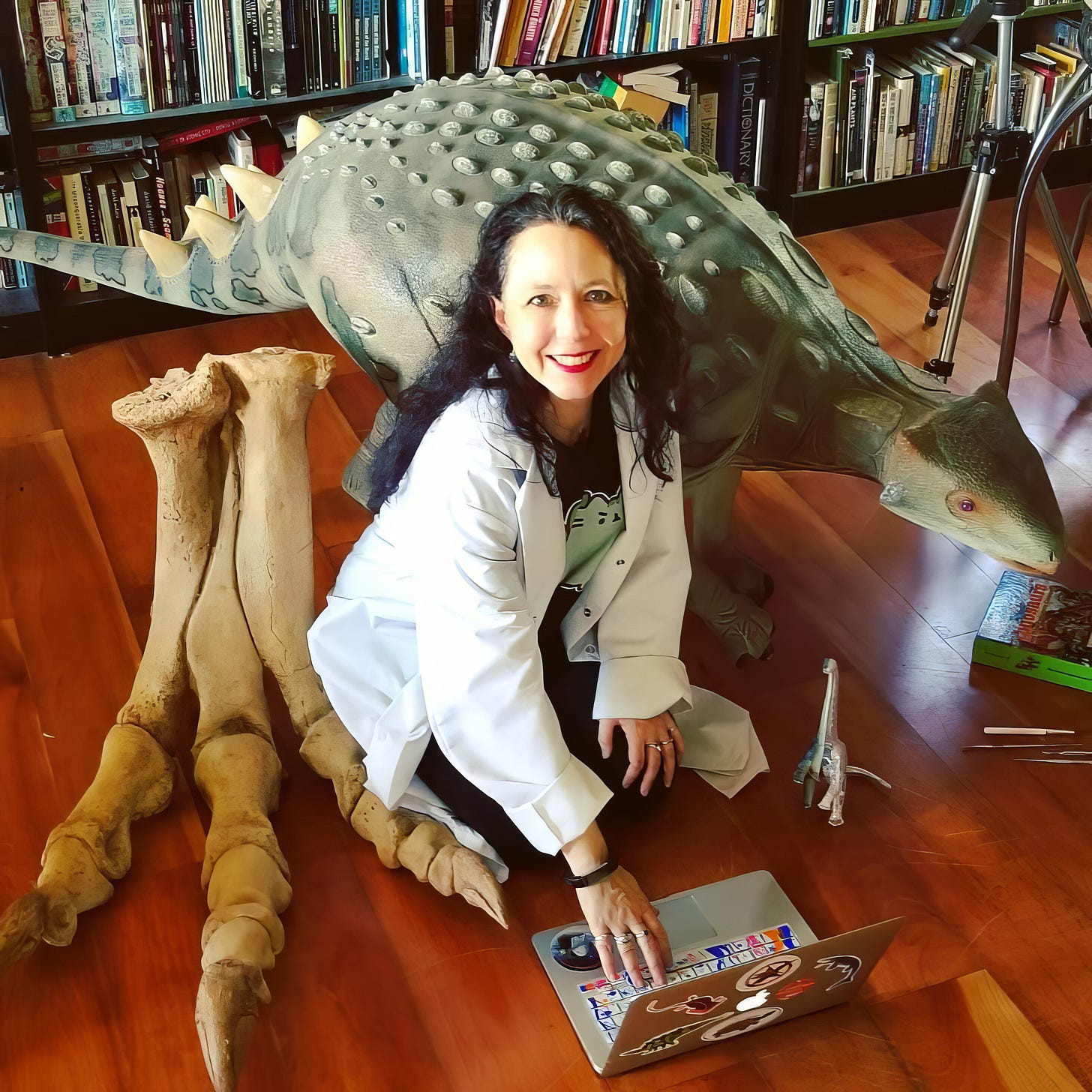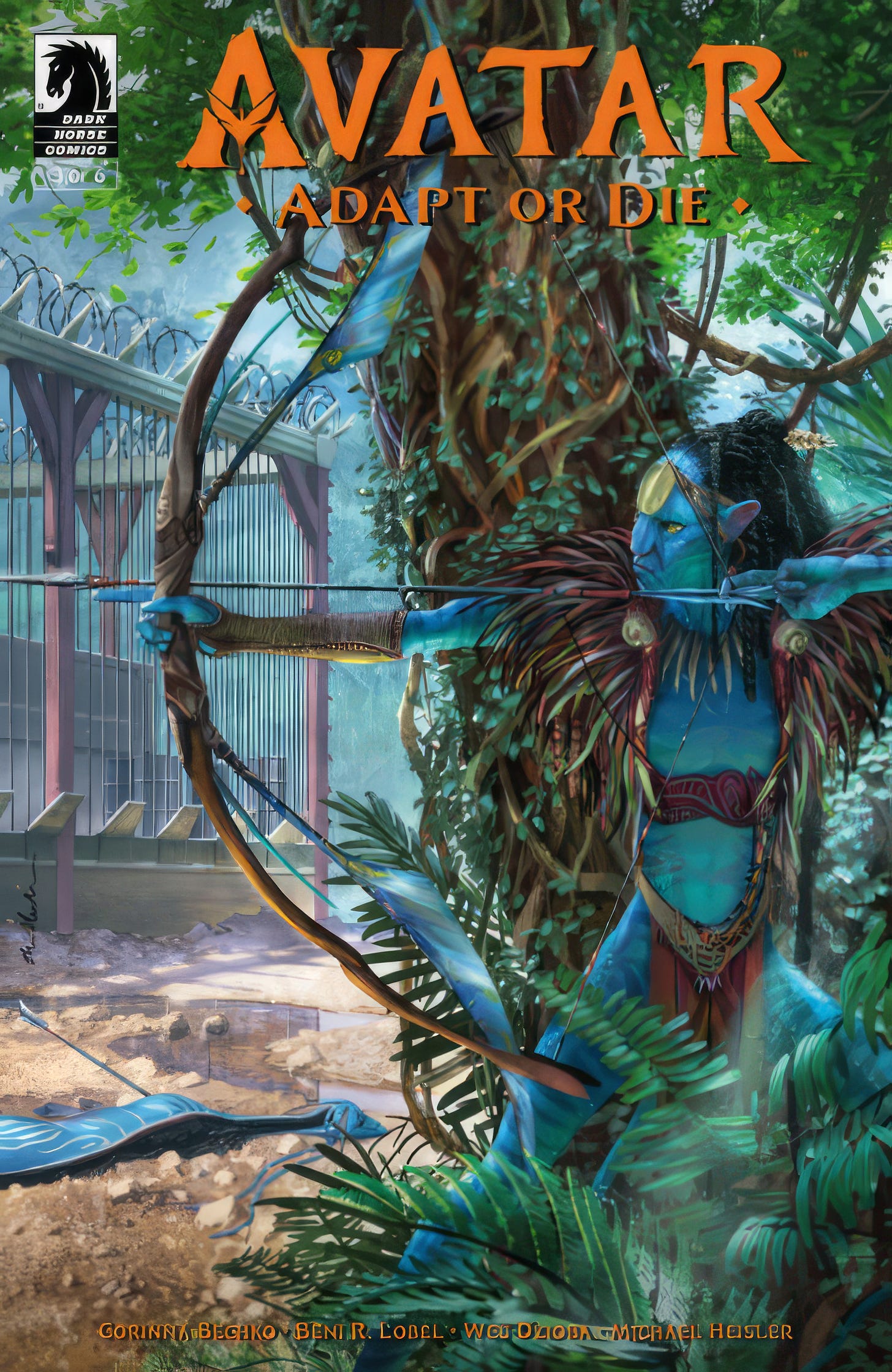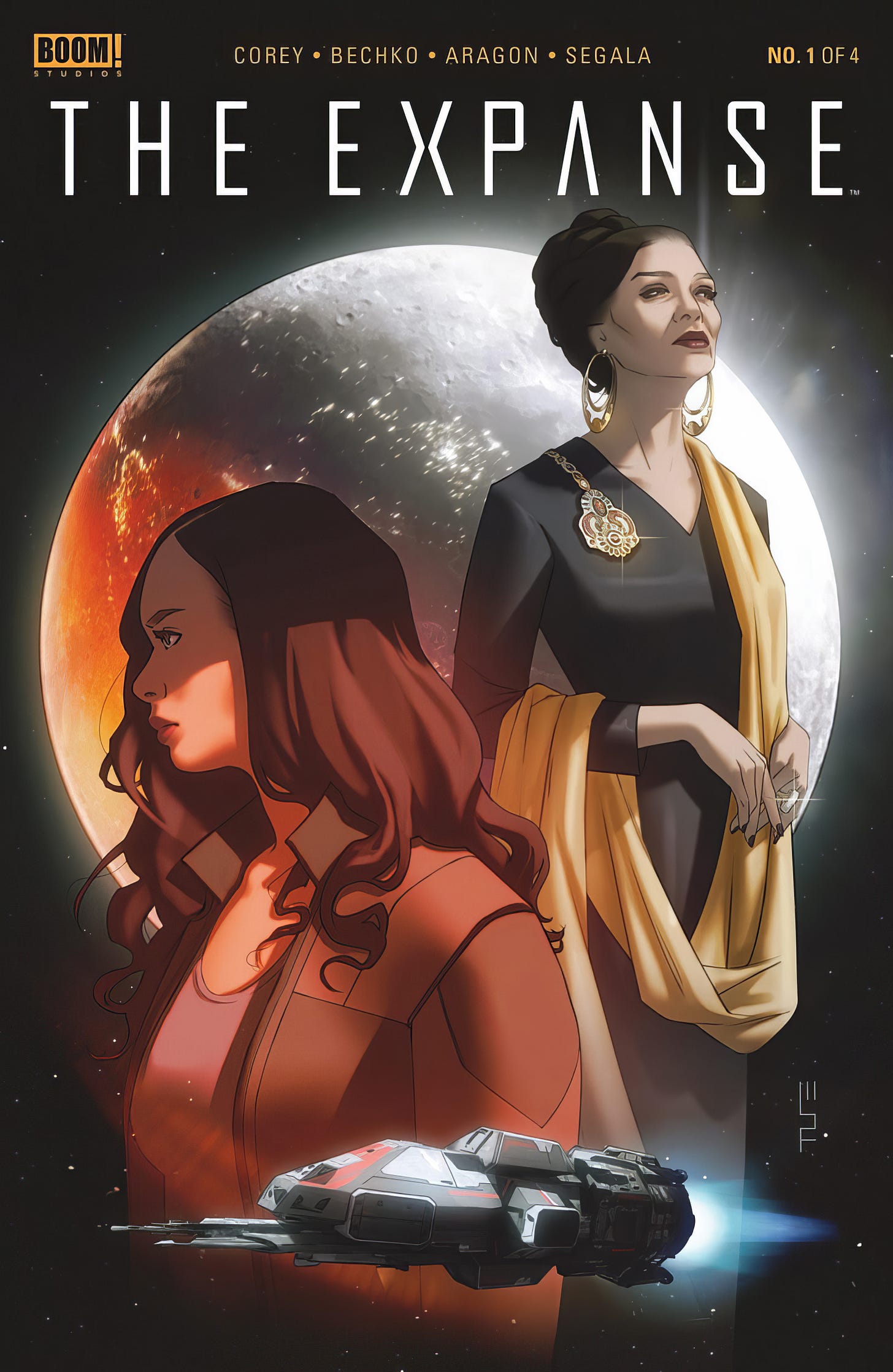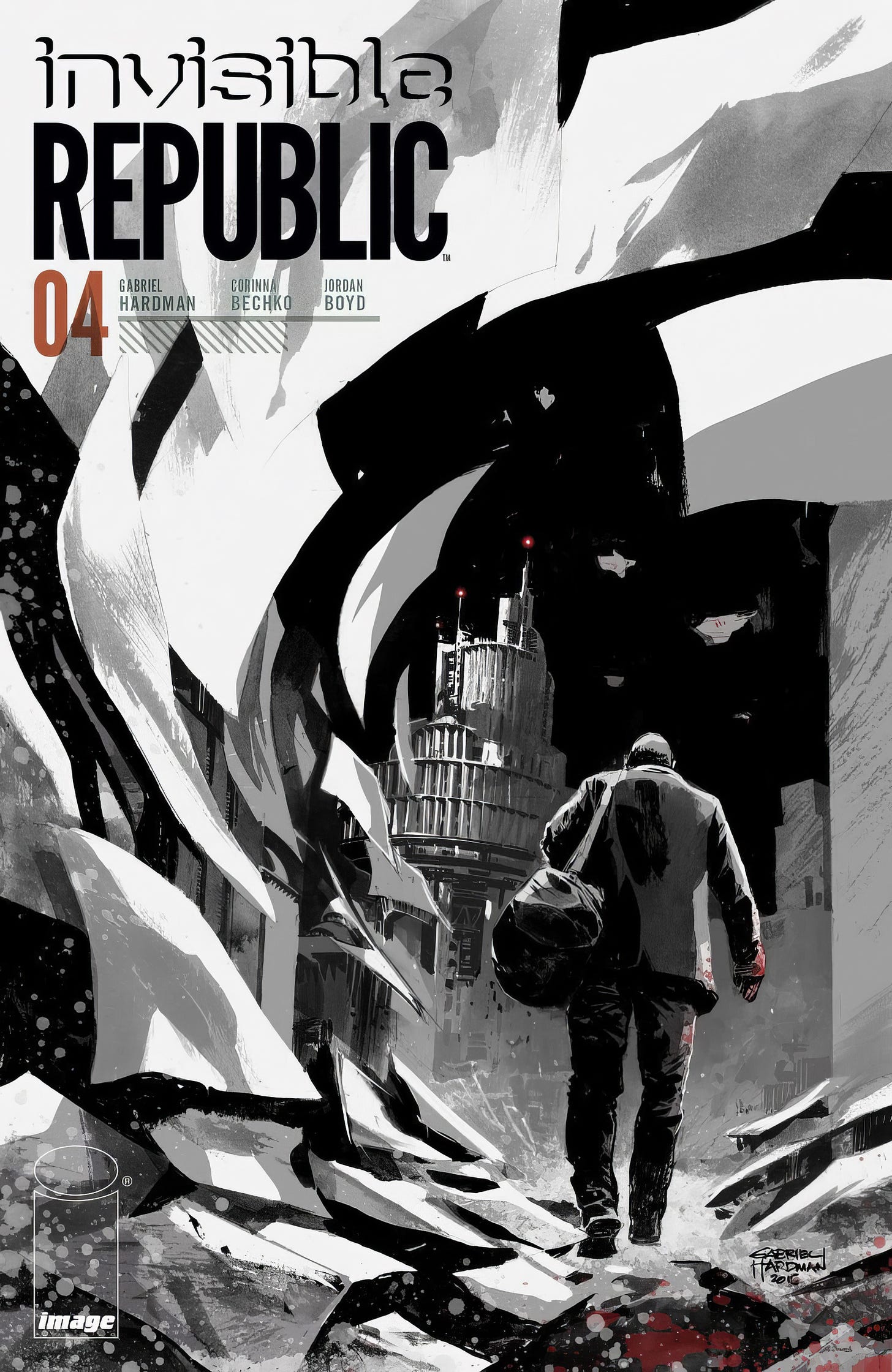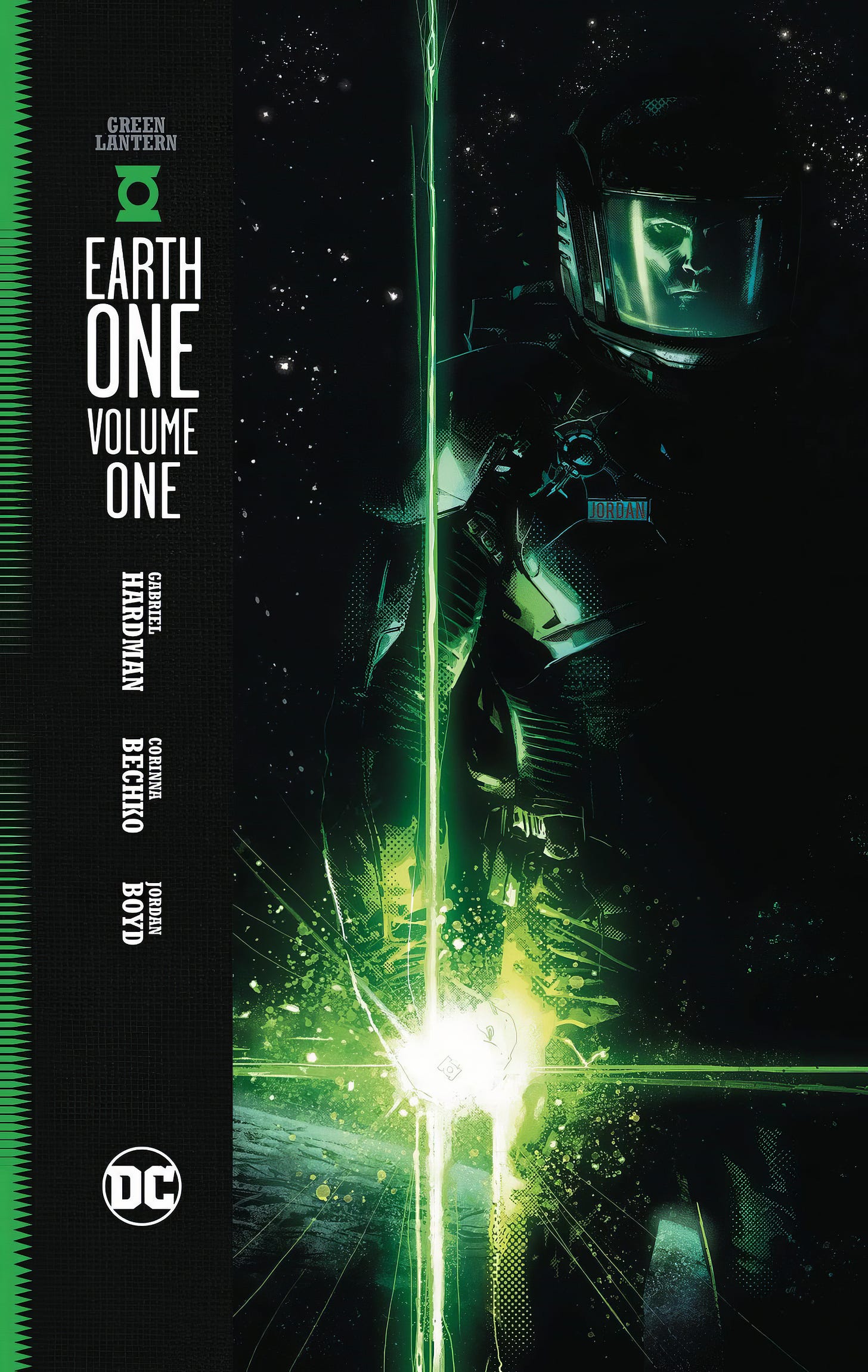Long Story Short ★ CORINNA BECHKO
A deep love for FOSSILS and HUMAN NATURE are the DNA of this Writer
Welcome to a Sample Edition of our LONG STORY SHORT★ PREMIUM format that is exclusive to PAID SUBSCRIBERS. We’re very excited to share our interview with Hugo- and Eisner-nominated New York Times best-selling author CORINNA BECHKO. The very skilled Los Angeles-based writer also works as a fossil preparator for the Natural History Museum and has written everything from comics, and prose short stories to books for young readers under the Smithsonian imprint.
BTP: Looking over your comics career that seems to have started in 2009 with a the creator-owned collaboration, HEATHENTOWN to working on licensed books like PLANET OF THE APES, to novel adaptions like THE EXPANSE and even your latest project, THE SPACE BETWEEN with artist Daniel Luckert, do you feel like you’ve gotten a handle on the craft of writing or is it something that changes with each new project?
BECHKO: The wonderful and terrible thing about writing is that I constantly feel like “yeah, I’ve got this!” and “I’ve completely forgotten how to write!” within the space of a single day. In truth, every project is different, so I think it’s healthy to begin with a dose of humility, especially in a collaborative endeavor like comics. I admit I feel that I’ve become less confident in my abilities as my career has progressed because I’ve finally become skilled enough to see where I’m lacking skills. I think that’s pretty normal too and can be helpful as long as perspective is preserved, and I don’t let it interfere with continuing to write. One thing I love about the craft is that in many ways it’s as simple as telling someone a story, and as complex as figuring out what it means to be human. There’s always something new to learn, a different way of saying something, a path that will illuminate more or obscure less. I’m willing to bet that there’s no earlier artform than storytelling, a thought that remains equally humbling and comforting.
BTP: That’s something I’ve experienced to some degree. Each project seems to be its own animal, and that requires understanding the physiology of what you’re hoping will be a good story. I haven’t stuck with any one genre, but what I have noticed is a style of telling that feels oddly my own. More than what I can say about my art... which is also all over the board. Did you study writing anywhere or do you have books that have helped you improve on your journey? Sometimes one doesn’t know what they don’t know.
BECHKO: I didn’t actively study writing, but I do read a lot. And I have read quite a few books about writing by working authors. One that stuck with me is The Year You Write Your Novel by Walter Mosley. Not all of his advice resonated with me, but I don’t doubt that he’s right and I’m wrong. Another is Ursula K. Le Guin’s Steering the Craft. A very funny one was Paul Bowles’ Days: A Tangiers Diary which I picked up hoping for some insight into how he worked but got instead a whole lot of snark about the publishing industry. Well, what did I expect? I suppose it’s instructive that even a person like Bowles had a hard time with some aspects of the industry. I do try to always keep learning though. There’s no perfect way to write, but my goal is to come as close as I possibly can.
BTP: Can you please walk us through your process for the world building and story building on THE SPACE BETWEEN? Do you start with the big “WHAT IF?” or does a character situation come up with a set of given circumstances?
BECHKO: This is going to be a murky answer because it all feeds in, at least most of the time. I do tend to start with a “what if?” but where it goes from there is a product of what needs to happen to make that question possible. In the case of TSB I started with the concept of a generation ship. I love the idea of these big space arks because there is something so terribly human about them. I know I keep coming back to the idea of people always being people, but I do feel like we often talk about tech and the natural world and the vast array of humanity as if these were all different, completely separate, things. But you can’t avoid the collision when you start to think about a gigantic social experiment sailing between the stars. My fascination with generation ships has much to do with the idea that by the second generation nobody chose to be there. And by the third or fourth they might have very different ideas about what should be done on board. By the end, they might not even understand why they shouldn’t be there, and what then? What if they don’t want to leave their home? You could apply this argument to anyone at any time, of course. I’m not too old to remember arguing with my mother as a teen with the classic refrain of “well, I never asked to be born!” But a generation ship makes it so the characters can’t opt out of the society. They can try to change it, or give up on it, but they can’t leave it. There is literally nowhere else to go.
Once I decided I wanted to tell a story about this I started doing research. I read a lot about various types of ships, what would be required, and the carrying capacity of that sort of environment. Then I read up on the ethics. There are whole books written about the implications of settlements on Mars or the Moon, and what it means if one person controls the means to produce oxygen, for instance. In short, there are a lot of ways to produce a fascist dictatorship and very few ways to ensure a democracy, but that doesn’t mean it’s impossible. I wanted to play with the idea that everyone might have had good intentions at the start, but that isn’t enough. A society must be a living entity, always open to new ideas but vigilant against sneaky forms of oppression. That’s why, uncharacteristically for me, this is such a hopeful book. I have spent a lot of time over the last few years thinking about the ways that a society can go wrong. I wanted to look at some ways that people could lead a society toward a saner, safer, more just collaboration between its members, and what happens if people have different visions or are misled by a couple of bad actors. And I didn’t want to leave out other types of animals! A lot of sci-fi feels very lonely to me because there are only other humans to talk to. I believe that people get weird if they divorce themselves too much from the natural world, so I felt it was important to have that component in The Space Between. Every decision I made in the book was a result of these core questions.
BTP: After I sent you this question I sat down and read THE SPACE BETWEEN so I could actually be more informed of how your answer would make sense. I hadn’t really zeroed in on the multi-generational sci-fi, let alone a ship, until I read Kim Stanley Robinson’s MARS TRILOGY. It’s a fascinating thing to consider, and the way you laid it out was particularly poignant. We are and are not out parents or grandparents. The nuclear family is almost as much a metaphor for launching into uncharted territories like space in a way. I really appreciate well-thought out systems and biospheres. Your world building on the Dodona was great. Especially when the secret sanctuary was revealed (not to give too much away).
BECHKO: Thank you so much! I’ve always loved the worldbuilding aspects of any project. I remember an assignment way back in elementary school about creating rules for another planet and what that would mean for things living there. I took it way too seriously and wrote a whole little booklet with drawings and a reference table.
BTP: When you start a project, are artists already attached, or do you have an artist in mind? How much does the artist bring to the story?
BECHKO: It varies from project to project, really. Often, I’ll be offered a list of options, or will be told some one in particular will be working with me. That’s if I’m lucky! Sometimes I don’t know who it will be until long after the script is finished. Occasionally I don’t know until the book is out. That makes things more difficult, but some publishers work like that.
With The Space Between, I brought the concept to BOOM!, they said yes with no one attached, then searched for interested artists. I looked at a lot of great portfolios, but Danny was the obvious choice. But then, once he fully signed on, it was like I had been handed the key that opened every story door. I had been reticent about including as many beasts as I wanted in the script, but Danny actually liked drawing the cats and dogs and other creatures. He rendered them as complete characters, as important to the story as anyone else. The climactic scene hinges on one person pouring all of his love and concern for the entirety of the ship’s population into a final act that benefits his pet. Seeing that love convinces the antagonist that they both share a desire to do the right thing, and that changes his mind, thereby saving everyone aboard. It’s an ending I would have never had the courage to write if I hadn’t been collaborating with such a brilliant artist and been confident that he would render the scene as poignant instead of silly. I can’t say enough good things about what he brought to the book, the care he took with building the world and showing the evolution of the society, and the ways he made the characters sing. He talked to me about ideas for the uniforms, how they would change over time, and how the colors would morph and evolve. It made the world of the book so much richer, and I’m grateful to my editor for putting us together.
I know comics can break your heart but when you really feel you are part of a team they can also surprise you in ways that can heal your soul. My experience on TSB was absolutely the latter. I wish it worked like that more often.
BTP: Couldn’t agree more on everything you said. As much as I love to be able to draw anything, I think Danny’s animal game was particularly strong and balanced out nicely with everything else. Are there artists that you’ve wanted to work with on particular projects or had them in mind when writing something ahead of time? When it comes to dialogue, how locked in are you when you hand the script off and how do you work with changes before it goes to print?
BECHKO: I recently got to work with someone who had been on that wish list for years: Jonathon Case. We collaborated on a short for the recent rebirth of EC Comics [ONI PRESS] and I can confirm that seeing that art come in was an absolute thrill. As for dialogue, I try not to be too precious. In general, I think it’s much better to be able to revise the final wording to fit the expressions and action of the finished art. Sometimes that doesn’t happen (and I know that this way of working must be stressful for the letterer) but I think it makes for better comics when it does. Best yet is a shared document with the editor where everyone can draw arrows and post notes on the art to best capture how things should shift if needed. I’m working with an editor who does that right now and it’s reminded me of what a gift that can be.
BTP: How do you remain flexible when a collaborator comes in who may or may not jibe with your story sensibilities and wants to put their own take on things? What are the differences between working with experienced artists and those who are not, and how do you adapt your scripts for each type?
BECHKO: It’s always a bit of a dance, and it’s impossible to escape some of the rough getting-to-know-you period. In general, I try to write fairly bare-bones scripts that call out the important story beats but don’t dictate things that aren’t “story specific.” I want my collaborators to feel free to drive the book forward and not feel hemmed in by my ideas. When I want to paint a complete picture, I use the tools of prose. But when I’m writing a comic, I feel that’s not my place as a writer. Sometimes, if someone is a newer artist or just new to comics, they will want a bit more input. That’s fine, and I’m happy to oblige! But I’d rather err on the side of assuming they have a vision that should be honored… At least until it interferes with the story. Sometimes there are things in the script that need to be there because they will pay off down the road, in another issue or at the end of the series. I try to call those things out in the description and will fight to have them included even if it creates friction, but usually the editor will step in before something becomes a test of wills. In general, I love the collaborative aspects of working with a team. I would have quit comics long ago if I didn’t.
BTP: This is a great revelation. Knowing when to fight for what is necessary to keep the integrity of the story I think is crucial for writing. But also understanding and trusting an editor’s input can be just as important. How hard was it to learn the difference and how did you navigate those waters? What do you, as a writer, want from an editor on your projects?
BECHKO: This is the one thing that has gotten easier about writing over the years. I’m much more willing to listen and learn now. I think when you are first starting out it’s common to feel that any input, no matter how friendly, wise, or well-intentioned, is criticism. And because writing tends to be a very personal act, even when crafting a story in someone else’s universe, that feels like a personal attack. It takes a while to realize that an editor is there to make sure you are telling the story that you want to be telling. Their whole job is to make you, the writer, look good. So why not let them do that? Sometimes it’s a matter of letting them guide you to toward a way of saying what you want to say in a more economical way. Sometimes they spot holes or inconsistencies. Often what I really want is confirmation that my story isn’t confusing. After all, if your editor can’t understand it, after all the comics they’ve read, chances are no one else will either.
BTP: Of all the licensed work and adaption you’ve done what are the differences in building story between established worlds and characters that are really well-known (Planet of the Apes, Green Lantern, Vampirella) vs. say characters from The Expanse novel? How much research do you need to do before you can bring a sense of ownership to the story?
BECHKO: Every project is different, but I generally try to do as much research as possible, as early as possible, looking at what makes the world feel unique. Not to nail down tech details or stylistic flourishes, but in the sense of the emotional rules of the particular universe. Then do a little bit more from the perspective of trying to capture the voice of the characters so that they sound like the originals, or, if they’re new, that they are characters who believably could have been produced in that world. I try to keep in mind that my first allegiance in a world I didn’t invent is to create something that works to make that world feel bigger. In the case of The Expanse I was writing a story that took place between two seasons of the show, so the characters had to start in a particular place and end in a particular place. That limited where they could go and what they could do, but in the end it was an interesting challenge and a world I loved spending time in, so I’m very happy with the result. I try to keep the sense of ownership for stories set in worlds that I’ve invented.
BTP: Respecting the toys you get to play with is a strong notion for me, sometimes to a fault. I think that could be very difficult to know where that line is, as if getting into a relationship with a new person. I mean, my first instinct is always to learn what makes the character tick and then to break with convention in a way that makes sense. I think our perceptions of well-established characters really adds to how much dimension a character has. One may look at Bruce Wayne as a scared child in a full-grown man’s body, or a reckless billionaire playboy who’s been numbed by circumstances and needs Batman as a way to cope. Is there a licensed character that you’ve worked on that aligns most closely with your way of writing that feels like a natural fit?
BECHKO: Hmm, that’s a good question. I think the closest was honestly Miss Fury. She was a lot of fun to write, and I felt like I really understood her motivations. But you’ve made an excellent point, there are many ways to approach any story but no matter what it’s important is to find a way in through the character. In the end, a story is really just a set of circumstances and how the characters react or fail to react to those circumstances. Different stories might require different notions about who that character is (don’t we all, like Bruce Wayne, contain multitudes?) and that in turn informs the direction the tale will take. Spinning out your example, the last time I wrote a Batman short I leaned into the fact that he’s also a persistent detective who loves to uncover secrets about what’s really going on beneath the surface of things. Once I had that clicked into place the rest of the script was easy.
BTP: When it comes to personal voice and style, in what ways have you been able to develop that over time with the projects you’ve done? Are they more prevalent on works where you’re the sole writer and creator of the story, or did you manage to make your mark early on?
BECHKO: I do think that I’ve developed a personal voice and style along the way, and I do think it’s more evident in worlds I’ve invented or helped to invent. Collaborating with another writer is always interesting because in the end the story is something that neither of you could have written by yourselves, and that can be a wonderful thing. I love it when a story surprises me, and that goes double for when it’s a story I’ve created or helped to create. My first book, Heathentown, touched on a lot of themes I’ve come back to again and again. It deals with a somewhat closed society that has developed around a particular set of circumstances, a doomed romance, and, most importantly, the natural world is a main character. A lot of the same themes can be seen in The Space Between, even though that’s a more hopeful science fiction story as opposed to a rather bleak horror story.
BTP: Your answer for some reason reminded me of the film, ANNIHILATION based on the book by Jeff Vandermeer. The (un)natural world plays a really interesting part in the sci-fi. Have you seen or read his work? Are there authors or creators that come to mind that leverage some similar themes that you’re exploring?
BECHKO: Yes, I love that whole series! I enjoyed the film as well, although nothing beats the books for me. I do seek out eco-horror and bio-based sci-fi whenever I can. I think one person who does this extremely well is Peter Watts. Some of the ideas in Blindsight and Starfish haunt me to this day. Kelly Link plays with tweaking the natural world in a lot of her stories too, although to a different end. Another book that has stayed with me is Roadside Picnic by Arkady and Boris Strugatsky. There is something so primal about the wrongness of what’s happened to that world that it bends everyone who even thinks about touching it.
BTP: I think the mastodon in the room is your background in zoology and working at the Natural History Museum in L.A. My childhood heart is plagued with jealousy...but I’ll get past it. :) I’m curious if you have a dinosaur related story or project that we’ve yet to see? Has anyone done a comic project of interest to you since you’ve been a comic reader?
BECHKO: I do admit that it’s a wonderful job so I can’t do much to assuage your jealousy! Does it help if I tell you my commute is sometimes 3 hours round trip? But yes, I do have a post-apocalyptic story I’ve never gotten off the ground that is set during a dinosaur dig. Often when I’m in the field I’m totally off the grid. Sometimes I wonder what would happen if something really terrible happened while I was out there. Someday I hope to tell that story! I’ve also written a book of short prose stories about different prehistoric creatures, but sadly the funding was pulled at the very last stage of that project. I regret that never saw the light of day. Happily, I also cowrote a book for the Smithsonian called Dig It! Dinosaurs and Other Prehistoric Creatures with Brenda Scott Royce which was just reissued as a fancy new activity box. That was a really fun project, and we have plans to work together again soon. As to other comics that I’ve read, there have definitely been quite a few! I loved reading Shing Yin Khor’s Tiny Adventure Journal entries about being the artist in residence at the Petrified Forest. I devoured Tyrant by Stephen Bissette, Gon by Masashi Tanaka, and Age of Reptiles by Ricardo Delgado back in the day. Recently I also enjoyed Abby Howard’s Dinosaur Empire! And of course I love Devil Dinosaur. I wish I had another me just to read all the titles I’ve not had the time to dig into.
BTP: Three hours to get to work, yikes! It was Delgado’s AGE OF REPTILES that had come to mind when I wrote that. If you could get Lewis LaRosa to work with you on that post-apocalyptic project, there’s no way it wouldn’t sell! Have you considered Kickstarting the short story prose book or at least shopping it around to agents? Any thoughts on Mark Schultz Xenozoic Tales?
BECHKO: I have thought about that, and it’s on my list of “maybe!” projects. I would truly love to do a dinosaur book. Well, another dinosaur book. But yes, Xenozoic Tales! How could I forget that title? In general, I think we need more Mesozoic-infused comics. They had a moment there for a while, but I haven’t seen too many lately. Bring back prehistoric prose and comics, I say!
BTP: Most writers are readers. I’ve actually read a few of the books you’ve recommended. Do you have any novel-length prose projects you’ve done or are working on? Would that be a natural evolution for you as a writer?
BECHKO: That makes me so happy! One of my greatest pleasures in life is when I recommend a book that someone then reads and enjoys. I hope I didn’t steer you wrong! I do have two prose novels in various stages of completion, although I view them more as working in a different but related medium than as an evolution. Comics are their own thing as far as I’m concerned. But I would dearly love to have a novel published too! The subject matter isn’t too far from my comics obsessions. One is historical horror and the other is dark science fiction.
BTP: Yes, the books you recommended on paleontology were great. I agree, I’m finishing the final edits on a third novel before sending that off to first-readers, and I love how different it feels than comics. In fact, I feel like my own voice is clearer and wished my comics work had been as much. Do you have an agent or plans to get one? Have you ever worked with an entertainment agent or rep?
BECHKO: Congrats on that! It’s no small thing to finish a novel, let alone three! I don’t have an agent, but I should probably try to fix that. I imagine that not having one does cut off some opportunities. I have worked with a rep back when it looked like either Heathentown or Invisible Republic might be translated into another medium, but I haven’t since then. My writing partner and husband at that time is in the entertainment business and is a talented storyteller who is passionate about directing, so it probably made more sense that we were angling toward film or TV then. Personally, now that I work solo, I’m happy with whatever happens that will make me enough money to keep writing.
BTP: One of the things that has been important for me is to get outside input on my stories before they go to print. Is that something that has helped you in anyway? If so, how did you cultivate a trusted network of individuals?
BECHKO: Oh, absolutely! I’d be lost without my writers’ group. It’s small in terms of members, but massively supportive. We meet semi-regularly to talk about our various projects and give each other pointers and gentle criticism. We each work in different fields, which I believe to be very helpful. A good story is a good story but it’s easy to become myopic if you only deal with a narrow genre or medium. We’ve done a couple of writing retreats together and I’ve always come away inspired and refreshed. It’s also important to have people you know you can turn to with frustrations and disappointments. I honestly don’t know what I’d do without them.
BTP: That is massive. I took a year-long sci-fi writing workshop which was good and helpful in a lot of ways. I learned how to critique people’s work a lot better, but it’s hard when you’re only able to get 8000 word snippets to be of any use. Especially when it’s probably a lot of setup for the rest of the novel. At any rate, the value of outside input has always been critical. But when it comes to monthly comics is your editor able to give you that important feedback?
BECHKO: Usually, yes. I’ve worked with a few that didn’t provide much, but I do rely on the ones who do! An interesting experience I had this year was being the writer-in-residence at a retreat in Albania for a week. It was my job to run workshops and critique the work of participants. I learned a lot from it, having not often been on that side of things. I came home with a whole new appreciation for editors, not to mention the beauty of Albania. Who knew it was full of gorgeous herpetofauna?
BTP: How about a reality check. What is a myth about writing comics that has yet to be dispelled for those who have high hopes of making a living at this business? How hard is it to get a project published even if you’ve been in the game a long time and how many projects have you developed that didn’t get picked up?
BECHKO: I think it’s that there’s a living to be made! Some people do only make comics, and live off of it, but the vast majority of us have other jobs too. I’m currently working two jobs at the Natural History Museum, doing a side hustle with the AP, doing occasional technical writing, and writing comics! It’s a lot to track, and sometimes just figuring out where I should be when it feels like a whole other job all by itself. And I’m one of the lucky ones because I’ve been steadily employed writing comics since 2009 with very few gaps in my resume. That said, it looks like there are more gaps than there have been in truth because I have collected quite a number of projects that ended up not going anywhere. Sometimes this is because an imprint ceased publishing before my project made it to the finish line, sometimes it was because payment didn’t materialize, sometimes it was another reason entirely. Just last year I had several projects fall through, and currently have one that’s completely done but seems to be stuck in the final phase. It’s easy to get discouraged by the odds, but on the other hand I do have over 200 individual issues out in the wild, not to mention a lot of other things like OGNs, short stories, and articles. That’s not nothing! Ultimately, I keep fighting to stay in the game because I love it and find it deeply satisfying. I feel the arts in all their forms are the purest distillation of being a human. To me that means both consuming art and making art. When I write I’m putting my particular idea of what it is to be a person out there, and I hope it chimes with someone else’s idea, or makes them think, or makes them feel something. But of course being able to buy groceries is nice too, and I do wish that aspect was easier.
BTP: You actually bring up something that I think would be helpful for creatives to understand. What happens to a project that gets sidelined or “almost finished” by a company that goes under? Do you get the property back? Can you shop it around elsewhere or are their contract stipulations that have to be met?
BECHKO: It really depends. I always keep things like that in my back pocket, idea-wise at least, in case I can somehow recycle at least a little bit of it. That can be tricky though, since a contract has usually been signed which stipulates some manner of NDA or proprietary content. Basically, when you work for hire, that’s exactly what it means. The company has hired you to do work, and what they do with it after that is up to them. That’s why it’s so important, to me at least, to try to have some projects that are my own. It can be demoralizing to have a string of projects fall through if you have no control over what happens next. But in the end, I did sign that contract, so I am bound by it. A lot depends too on what you’ve developed. There are some things I’ve worked on that had ideas in them that I really liked and could perhaps develop into something else later. And then there are things like the Bill and Ted story that was shelved just before completion last year. It dealt with the Princesses traveling through time and was very anchored to the Bill and Ted mythos. That was a fun project, but it wouldn’t translate well into any other universe. So, I will just have to sigh ruefully over the fact that it will never see the light of day.
BTP: I believe in putting good vibes out into the universe, hoping that something will inspire or inform. What about the work as a writer that gives your life purpose and meaning? What do you hope it gives others to keep them coming back to enjoy more of your stories?
BECHKO: I like that idea! I often think about the sense of awe I get working in the natural sciences and try to transfer that into what I’m thinking about when I write. My favorite genres to work in are horror and sci-fi, so that tracks because a sense of awe is a huge component of both. Some horror is about gore and disgust, of course, but my favorite type involves forces beyond our understanding that are both beautiful and terrifying. The universe is an amazing, wonderful, scary place and I’m intensely curious about it. I hope that some of that comes through in my writing and inspires others to stay curious too. The flip side of that can be a world that feels too big and complex to comprehend. That can be lonely and lead a person to grasp for meaning or fall into depression. I tend to put a lot of emphasis on found families in my stories, because I think we have to find or make our own meaning for ourselves, and for me that involves the people who choose to share my life and passions. It’s these connections I always come back to, both in my personal life and in my writing.
BTP: Great answer. That makes a lot of sense.
BTP: As creatives, we can’t help but keep creating. Still, I often wonder what plans people have for their inevitable “retirement”. What does that look like for you, and have you planned ahead for such things? What’s the best thing about being a writer now that you wished you’d had when you were younger and vice versa?
BECHKO: Hmmm, retirement. Honestly, I hope it’s just more free time to write! I’d love to have the freedom to primarily work on personal projects and not worry so much about hustling deadlines. I’m fortunate in that I love my day job, but it’s fairly physically demanding so I don’t think I’ll be able to do it forever. I do hope I can write forever though, or at least for the rest of my life since presumably the ability to manipulate physical matter is an important component of writing. Ghost Corinna will probably just read.
BTP: Haha...Ghost Corinna. Life is the only obstacle to a creative life. We can’t go around it, so I guess we’ll have to go through it!
BTP: Thanks so much for chatting with us today, it was really great, Corinna. Please tell everyone where they can reach you and find out more about your work. (Please add links if you’d like).
BECHKO: Thank you! This has been great, and a lot of fun! I go by my name (CorinnaBechko) everywhere.
Website: www.corinnabechko.com
Instagram: https://www.instagram.com/corinnabechko/
Bluesky: https://bsky.app/profile/corinnabechko.bsky.social
Facebook: https://www.facebook.com/CorinnaBechko





